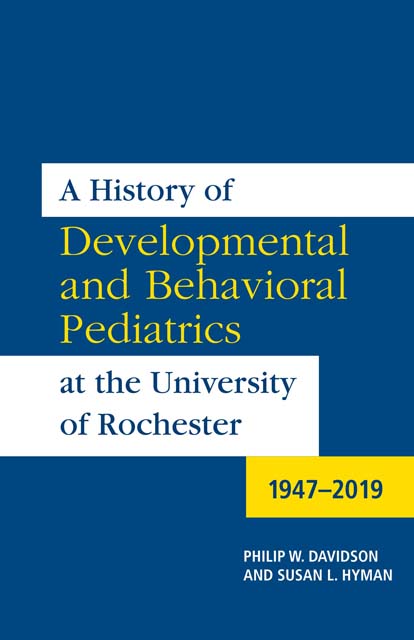Book contents
- Frontmatter
- Dedication
- Contents
- Foreword
- Preface
- Epigraph
- Chapter One Historical Context
- Chapter Two Laying a Foundation
- Chapter Three Opportunities
- Chapter Four Changing of the Guard
- Chapter Five Emergence of Focus
- Chapter Six Team Building
- Chapter Seven Maturation
- Interlude: (Or Let Us Take A Break From Acronyms)
- Chapter Eight Expansion
- Chapter Nine Emergence of Research Programs
- Chapter Ten Change in the Wind
- Chapter Eleven Beyond Dreams
- Chapter Twelve DBP’s Clinical Program Expands
- Chapter Thirteen Dramatic Growth of Autism Research
- Chapter Fourteen Changing Relationships
- Epilogue
- Acknowledgments
- List of Abbreviations
- References
- About the Authors
Chapter Thirteen - Dramatic Growth of Autism Research
Published online by Cambridge University Press: 14 June 2023
- Frontmatter
- Dedication
- Contents
- Foreword
- Preface
- Epigraph
- Chapter One Historical Context
- Chapter Two Laying a Foundation
- Chapter Three Opportunities
- Chapter Four Changing of the Guard
- Chapter Five Emergence of Focus
- Chapter Six Team Building
- Chapter Seven Maturation
- Interlude: (Or Let Us Take A Break From Acronyms)
- Chapter Eight Expansion
- Chapter Nine Emergence of Research Programs
- Chapter Ten Change in the Wind
- Chapter Eleven Beyond Dreams
- Chapter Twelve DBP’s Clinical Program Expands
- Chapter Thirteen Dramatic Growth of Autism Research
- Chapter Fourteen Changing Relationships
- Epilogue
- Acknowledgments
- List of Abbreviations
- References
- About the Authors
Summary
Start by doing what's necessary; then do what's possible; and suddenly you are doing the impossible.
—Francis of AssisiContinuous funding from multiple sources for multiple projects is the key ingredient of programmatic research. Building on the research programs we discussed earlier, DBP was able to accomplish the incredible feat of maintaining and expanding the Seychelles Child Development Study while securing and retaining funding for programmatic research in ASD. Figure 13.1 shows the impact in US dollars of this growth. The most impressive growth took place in ASD research and the history is remarkable.
Treatment and intervention research were the focus of the efforts of the STAART Project and its participation in the AS ATN. The ASD research group expanded both group and single case study design research, with recruitment of participants from the DBP clinical services, from the ATN, and from the division's numerous community connections. Larger numbers permitted larger group designs and more specific studies (Hyman et al., 2016).
In 2008, Dr. Smith recruited Laura Silverman, PhD. Dr. Silverman joined the division after completion of her postdoctoral fellowship. In addition to clinical responsibilities, she built on the work in gesture and communication started in her doctoral work with Dr. Bennetto. She pursued additional translational studies with Lisbeth Romanski, PhD, using the same paradigms to study gesture understanding in humans and primates.
A second portentous faculty recruit was Suzannah Iadarola, PhD. Dr. Iadarola had been a research assistant in the STAART program prior to obtaining her PhD with Sandra Harris, PhD, at Rutgers University and completing a pre- and postdoctoral fellowship at Children's Hospital of Philadelphia. Dr. Iadarola was mentored by Dr. Smith and collaborated with him in the promotion of the understanding of the interface of behavioral and developmental approaches to intervention. Her very exciting NIH Research Scientist Development Award investigated the stress experienced by families of children with autism and how that impacted intervention.
The Smith Legacy
With collaborators across the division, Dr. Smith led the University of Rochester to prominence in funded intervention research related to ASD. In his years at Rochester, Dr. Smith extended his seminal work establishing Early Intensive Behavioral Intervention as an evidence-based intervention to confirming the efficacy in community application and extending the evidence base to family participation in behavioral intervention.
- Type
- Chapter
- Information
- A History of Developmental and Behavioral Pediatrics at the University of Rochester1947-2019, pp. 93 - 102Publisher: Boydell & BrewerPrint publication year: 2021

